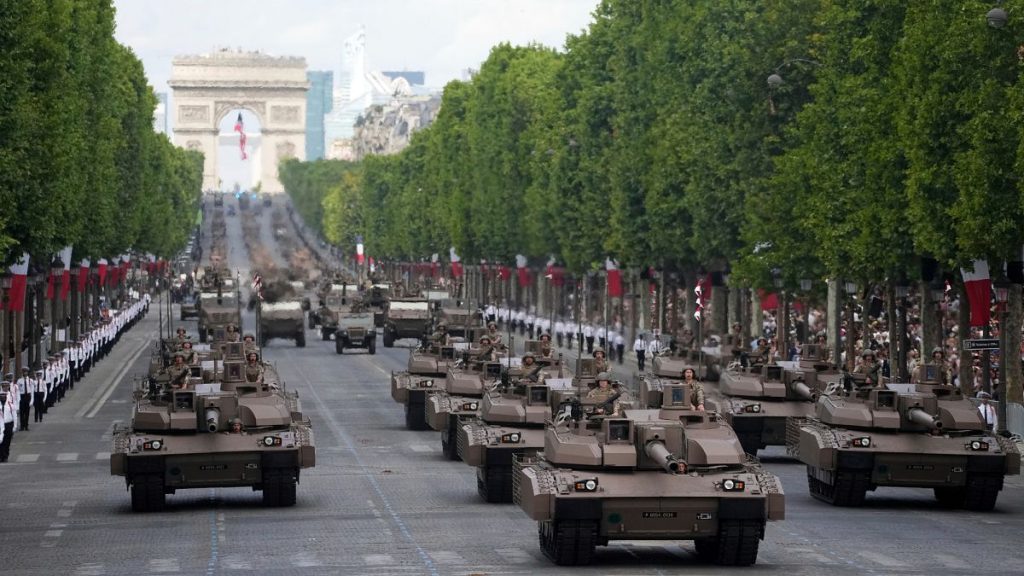France is celebrating Bastille Day with grand events showcasing military power and national pride. The festivities include a military parade down the iconic Champs-Élysées, flyovers by military jets, and a spectacular drone light show accompanied by fireworks at the Eiffel Tower. This year’s celebration is particularly significant as Indonesia is honored as the special guest country, marking an increasing international nature of the ceremony that reflects modern diplomacy and military partnerships.
| Article Subheadings |
|---|
| 1) Historical Significance of Bastille Day |
| 2) Key Features of the 2025 Celebrations |
| 3) International Representation and Diplomacy |
| 4) Special Honors and Recognitions |
| 5) The Future of French Military Initiatives |
Historical Significance of Bastille Day
Bastille Day, celebrated annually on July 14, commemorates a pivotal moment in French history when citizens stormed the Bastille prison in 1789, igniting the flames of the French Revolution. This event not only symbolizes the fight against tyranny but also marks the birth of modern democracy in France. Over two centuries, the day has transitioned from a local uprising into a national celebration of unity, freedom, and the ideals of the Republic. Subsequently, the fall of the Bastille signified the beginning of a series of events that ultimately dismantled the monarchy and established the principles of equality and liberty.
Key Features of the 2025 Celebrations
This year’s Bastille Day is marked by impressive displays, including a military parade along the renowned Champs-Élysées featuring approximately 7,000 participants marching on horseback and in armored vehicles. President Emmanuel Macron reviewed the troops, signaling the importance of the military to national unity. The celebrations also included aerial flyovers where fighter jets left trails of smoke in the colors of the French flag—blue, white, and red—symbolizing national pride. As evening fell, Paris came alive with a breathtaking light show created by drones, culminating in fireworks igniting the Eiffel Tower, offering a visual spectacle cherished by both locals and tourists.
International Representation and Diplomacy
This year’s celebration is particularly notable for its acknowledgment of international relations, having chosen Indonesia as the guest of honor. Prabowo Subianto, Indonesia’s Minister of Defense, led his country’s delegation, emphasizing the importance of Indonesia as a major Asian economic and military player. In recent meetings, there was a strategic focus on strengthening Euro-Indonesian relations with a new trade agreement that secures tariff-free access for Indonesian goods in the European Union. Their presence, alongside troops from Finland, Belgium, and Luxembourg, reflects the celebration’s evolving character as an international diplomatic event, fostering cooperation across nations.
Special Honors and Recognitions
Alongside the festive activities, Bastille Day serves as a platform for recognizing individuals who have made significant contributions to society. This year, notable figures were honored, with Gisèle Pelicot receiving the prestigious Legion of Honour for her courageous stand against sexual violence. Her four-month trial, which revealed a harrowing account of assault, turned her into a global advocate for victims. Likewise, Fousseynou Samba Cisse, who heroically rescued two infants from a burning building earlier this month, was recognized for his bravery, showcasing the day also serves as a reminder of the extraordinary efforts individuals can make in their communities.
The Future of French Military Initiatives
In a speech preceding the celebrations, President Macron announced a significant increase in military spending, amounting to €6.5 billion over the next two years. This decision has been propelled by the escalating geopolitical tensions involving Russia, persistent threats from terrorism, and the growing complexity of cyber warfare. His remarks highlighted that since 1945, threats to French freedom have become more pronounced, prompting deep reflection on defense strategies and international alliances. The commitment to bolstering military capabilities not only reinforces national security but also signifies France’s contribution to collective European defense efforts.
| No. | Key Points |
|---|---|
| 1 | Bastille Day, celebrated on July 14, commemorates the French Revolution’s onset. |
| 2 | The 2025 celebrations included a military parade and aerial displays over Paris. |
| 3 | Indonesia was honored as the guest of honor, highlighting diplomatic relationships. |
| 4 | Special awards, including the Legion of Honour, were bestowed on notable individuals. |
| 5 | President Macron announced increases in military spending to address national security threats. |
Summary
The Bastille Day celebrations in 2025 highlighted both the historical importance of this national holiday and its evolution into a platform for international dialogue and recognition. Through gatherings that commemorate past struggles for freedom while also addressing current geopolitical challenges, France reasserts its commitment to democracy and cooperative defense. The inclusion of international guests and increased military funding signals a proactive approach to upcoming global threats, reinforcing the significance of unity and resilience in the face of adversity.
Frequently Asked Questions
Question: What does Bastille Day commemorate?
Bastille Day commemorates the storming of the Bastille prison on July 14, 1789, which marked the beginning of the French Revolution and the fight for democracy in France.
Question: Why was Indonesia chosen as the guest country for the celebrations?
Indonesia was selected to highlight the strengthening of economic and military ties between Europe and Asia, reflecting the increasing international nature of Bastille Day.
Question: What kind of events take place during Bastille Day celebrations?
Events include a military parade, military flyovers, a drone light show, fireworks, and special awards for individuals who have demonstrated extraordinary acts of bravery or contributions to society.


